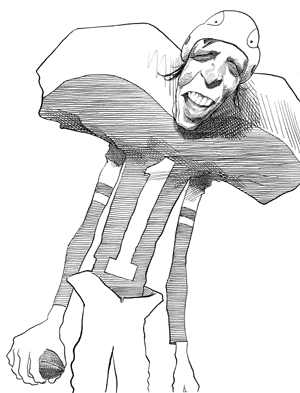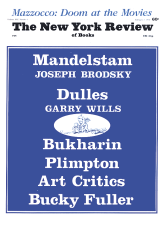Now that football has entered the literary life of this country, it has lost its innocence. We’ve begun to study it, analyze it, look behind the scene. We now see that it is no longer simply a game, however violent and complicated, but like other kinds of big-time entertainment a mixed bag of fun and business and virtuosity, and full of the folklore of boyish America. We are now sophisticated enough to know that there isn’t one thing called football: there is the game on the drawing board and the field; there’s the whole entrepreneurial, commercial side; there’s the life-style of the players; there’s the awe and cynicism of the spectators; there’s the inflated industry of sports writing with its façade of “color” and its pretense of revealing the inside stuff; and finally there’s the combination of spectacle and “fandom” and the intricacies and sublimated violence of war games that seems to pull everything together, particularly on Sunday afternoons.
It is George Plimpton’s achievement, probably not consciously, in his sprawling new football book, to get into all these diverse aspects of the sport. I suspect that the reason Plimpton was able to cover so much ground is that the subjects, the personal and football stories of Alex Karras, the appealing Detroit defense tackle, and his teammate, John Gordy, the offensive guard, along with Plimpton’s account of his four-play TV special as the Colt’s quarterback—that these subjects resist focus in the book. And because Plimpton does not pretend to have a tight system of organization or selection, he manages to touch all bases: the game on the field, the locker room, the owners, the coaches, the fans, and the private lives of the players, a good part of which appears to consist of pranks and escapades.
Much of the book is a kind of first-person third-person monologue about Karras and Gordy, but most of it is steeped in that atmosphere of boyishness and machismo that has become the trademark of the all-American man. It’s probably right that Plimpton does not put down completely the kid stuff that so many overgrown football heroes can’t seem to outgrow, for if he had he either couldn’t have written the story or would have produced another exposé. And who needs a football Watergate? Besides, there is nothing so boring as an exposé of something we already know and don’t care about, like the seamy side of sex, for example. With all our other troubles, what contribution to progress and enlightenment is made if we learn that the clean-cut athletic celebrities, the idols of American schoolboys, the pillars of every middle-class locker room, are venal, violent, pill-popping, perverted, full of hate, and so scared they have to work themselves up to forget they’re scared?*
True, Plimpton does maintain an idyllic image of Karras and Gordy and |most of their teammates, and, therefore, of football itself. But he does not hide the kind of childish humor and horseplay that only overgrown boys and retarded businessmen hold on to. I know that Plimpton does not normally go in for this, so it must be a side-effect of his evident intention to create a sympathetic but true portrait of the football player not only as an athlete but as a regular guy. To be sure, Plimpton’s clean unpretentious prose—which immediately separates him from most sportswriters—and his friendly reading of Karras and Gordy make for an intimate, humanizing replay of their lives on and off the field. But, frankly, one effect of this true story, particularly in the first part, is to make one feel a little uneasy about one’s passion for football. I, for one, would like to take my football straight, without the personality of the all-star boy.
Granted that Plimpton wanted to bare the souls and the extracurricular activities of the football fraternity, still he might have played down the schoolboy stuff and played up Karras’s and Gordy’s more impressive side, their sharpness and sophistication, for example. Thus both of them would have come off better without the practical jokes, particularly in the incredible “Alex Karras Golf Classic” that sounds like a parody of an advance man’s dream.
The fact is that football is too complex a game for overgrown kids. Whenever I’ve been in a locker room after a game, I’ve been struck by the alertness of the players, who were keener, I must say, in assessing what happened than most of the reporters, who asked foolish questions and then couldn’t understand the answers. I’ve been surprised to find that there was no horseplay at all, certainly not the kind that you might find in teen-age gyms or health clubs for middle-aged businessmen. The fact is that when Karras and Gordy are not trying to act like folk heroes they come off almost charismatically bright and attractive. Karras, particularly, has a quick head as well as body and has that ability to spot bullshit that many professional thinkers might envy. And when they talk about the technical things that only coaches and players and a few football buffs know anything about, they sound as astute and as expert as any military strategist, and less phony.
Advertisement
Plimpton himself obviously knows a lot about the game, much more than most of the writers who cover football, and the latter part of the book is quite good, particularly when he tells his own story, much of it in diary form mainly about his stint at quarterbacking the Baltimore Colts for TV in an exhibition game. His account of his own feelings about getting beat up in practice, about his fears, his awkwardness, his trying to keep up with the complexities of the game—all his feelings and reactions have a directness and authenticity because he is involved in a side of football to which he can relate completely. When Plimpton puts more emphasis on the actual game and on his relation to it than on its personalities, his writing is clean and unassuming and far superior to the overwrought, concocted prose that has become the norm for most sports writing.
Because Plimpton’s book takes us into the Americana of sports, it not only leads someone like myself, who frankly is hooked on football, to question his feelings about the game, or at least about the character of the players and the fans, but it also raises questions about sports writing in general. We tend to forget that in this age when we hear so much about mixed media and mass communication, journalese has become a major industry. And sports writing, which is a staple of this industry, is generally so undistinguished, taking refuge in an off-the-cuff personal style by writers who lack a personal style, that it attracts very few real writers. Those writers who have turned to sports, like Malamud, Roth, Sorrentino, have done so mostly in fiction, where it is possible to deal with this side of American life in an ironic or mythical way, or to stylize it by connecting it with other modes of living.
We tend to forget, too, in a time when everybody is a writer and everything from advertising to amateur photography is creative where it is not therapeutic, that only the new journalism has solved the problem of how to write on a subject that has little to do with the rest of one’s mind. Even so gifted and self-projecting a writer as Mailer couldn’t make it on the moon; the gap was so big he couldn’t bridge it with his most transcendental sexual theories, as he almost did when he covered the Ali-Frazier fight.
Perhaps the intriguing thing about football is that it is so marginal to what we think of as our main concerns, at least on the surface. If it is true that sports represent for many people their certificate of Americanization, for some their only one, still it is because the addiction to sports cuts across social and personal lines and not because of one’s bonds with either the players or the fans. My own theory—the advantage of which is that it cannot be disproved, though I must admit it can’t be proved—is that football permits one to indulge all those urges toward violence and patriotism normally taboo for politically sophisticated people. In this respect, football is like a just war, something we haven’t had for some time, and besides, one which we don’t have to fight. Though one has to wonder whether the changing feelings about the justness of the war in the Mideast will affect my theory of political catharsis.
While recently watching the NFL play-offs, I found myself drifting back to Plimpton’s account of what Karras and Gordy felt about their careers and thought about during a game. Both were taped for sound in one exhibition and Plimpton includes the transcript in his book. Karras is the more colorful figure and more of an actor, but even discounting his awareness of being on stage, his freewheeling chatter is made up of boyish fear and machismatic bluff, as he ranges over such fixtures of football as pep talks to teammates, quick diagnoses of plays, schemes to get past the guard to the quarterback, and sounds of crashing, swearing, and vomiting. Like a battle scene in a naturalist novel, this close-up would seem to give a sense of life at the front, or “in the pit” as they call it in football. But football is not fiction; and if football is itself a demilitarized version of the trenches, then its “human” side is a journalistic invention, which can only distract one from the game itself.
Advertisement
My own experience is that, like a formal critic, one is closer to the spirit of the game if one looks for all the technical stuff, such as the match-ups, for example, the kind of thing that marks the difference between two teams on any given day. Maybe this is a form of athletic snobbery or pretension, but it does create at least the illusion that one is not a dilettante. My human interest, I must confess, is limited mostly to the fortunes of the players in action, and the effect on the score. Thus, for instance, if one watched Gregory in the Dallas-Minnesota play-off, one could see how much the Cowboys were hurt by the loss of Lilly. And in the Miami-Oakland game, for example, it was helpful to follow the Miami guards to understand one of the things that made up what is often referred to as the precision of the offense. The rest is gossip which as with art confuses the life with the work.
Not the least value of Plimpton’s book is that it makes one more aware of two different approaches: that of the professional spectator and the engagé amateur. My own loyalty, for example, is to the game; Plimpton’s, because it is more personal, is to the players as well. However, one of the literary advantages of his approach is that it frees him to undercut the standard image of the sports hero by making it part of Plimpton’s autobiography.
This Issue
February 7, 1974
-
*
For the low-down on football, there is the novel North Dallas Forty by Peter Gent (Morrow, $7.95), who played for the Dallas Cowboys. With its fictionalized version of the drug and sex scene in football, the book reads like a “true confession” by someone who is obviously a better end than a novelist.
↩




